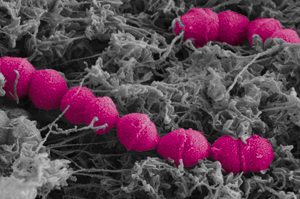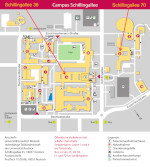AG Oehmcke-Hecht
Contact
PD Dr. rer. nat. Sonja Oehmcke-Hecht
location
Anfahrt zum IMIKRO
Main Topics
Pathogen-induced activation of the human coagulation and contact systems
Systemic infections trigger activation of coagulation and contact pathways, which both restrict pathogen dissemination and contribute to disease pathology. Our work elucidates how bacteria and viruses interact with these haemostatic defenses and how their dysregulation drives severe infectious disease
Funding
DFG - Projektnummer 201106193
DFG - Projektnummer 316733765
Koinfekt - Forschungsprojekt im Rahmen der Landesexzellenzinitiative Mecklenburg-Vorpommern, gefördert von der Europäischen Union (ESF)
Host proteases as regulators of bacterial virulence and invasive infection
Infection sites are characterized by the activation of neutrophil, coagulation, and contact system proteases, generating a highly dynamic proteolytic microenvironment. We investigate how these host enzymes modify bacterial virulence traits, biofilm behavior, and invasive potential, thereby influencing whether infections remain localized or progress to severe disease. Understanding these mechanisms may reveal new opportunities for targeted therapeutic intervention.
Group
Group leader
Team
| Maresa Possehl | MD | +49 (0) 381 494 5939 |
| Annika Rademacher | MD | +49 (0) 381 494 5939 |
| Clara Lohmann | MD | +49 (0) 381 494 5939 |
Technical assistant

Jana Bull
- Medizinisch-technische Assistentin in der Forschung
am Institut für Medizinische Mikrobiologie, Virologie und Hygiene
+49 (0) 381 494 5957
+49 (0) 381 494 5794
+49 (0) 381 494 5799
+49 (0) 381 494 5902
jana.normann{bei}med.uni-rostock.de
Alumni
| Dr. rer. nat. Juliane Köhler |
| Dr. rer. nat. Ramona Nitzsche |
| Dr. med. Carolin Trepesch |


